![[Crunchyroll promo image]](/images/reviews/hozukibox.jpg) |
| AKA: 鬼灯の冷徹 (Hōzuki no Reitetsu), Cool-Headed Hozuki (Literal Translation) |
| Genre: Black Comedy, Satire, Gag Comedy |
| Length: Television series, 13 episodes, 24 minutes each |
| Distributor: Currently licensed by Sentai Filmworks. |
| Content Rating: 14+ (Black humor-like slapstick violence, mild and occasionally weird fanservice.) |
| Related Series: N/A |
| Also Recommended: Gugure! Kokkuri-san, The Eccentric Family. |
Notes: Based on the manga written by Natsumi Eguchi, serialized in Kodansha's Weekly Morning magazine.
The spelling of the main character’s name is not consistent in English-language media; it has been spelled variously as “Hoozuki,” “Houzuki,” and “Hozuki,” and we have gone with the last of these. |
Rating:      |
Hozuki's Coolheadedness
Synopsis
By the 21st century, Hell is overpopulated, and the demon ogres running the place are overworked. The one who has to oversee all of this is King Enma's personal aide, the demon ogre Hozuki, who is far more intelligent than his superior and knows it. Having stayed with the times, hell has long turned into a bureaucracy; there's as much torturing and screaming as before, and by Golly, Hozuki's going to make sure it happens effectively, damn it!
Review
Stig: Watching anime has always been a cultural thing, and the funny thing about being a foreigner for Japan is that, whatever happens in any kind of show I choose to watch, it's going to be subjected to that interpretation or opinionating about the craziness going on. There is some kind of self-explanating joke that simply goes "Oh, Japan...." that supposedly explain how they are so much weirder than the rest of the world, but what does that say about me, I wonder -- as well as everyone else on this planet -- when we embrace it so?
Nico: Well, I'm sure that there are plenty of cultural artifacts here in the U.S. that the Japanese, and the Norwegians, for that matter, would find plenty baffling (deep-fried ice cream, anyone?), so perhaps I can't talk. In any case, I've read a fair bit about how the industries behind Japan's popular media were much slower to actively seek out a foreign audience than those of, say, South Korea, and anime's popularity on this side of the Pacific generally has little, if anything, to do with targeting on the part of the animation studios or mangaka. Because of that, you sometimes get a series that's just going to take a bit of work on the part of English-speaking audiences, and 2014's Hozuki's Coolheadness fits neatly into that category, down to its cumbersomely-translated title. The references are easy to miss and the jokes are often highly specific to the puns and conventions of the Japanese language, but if one's willing to do a bit of homework it can be quite a witty series, if one whose strain of humor is (unsurprisingly) more than a bit morbid.
Hozuki's Coolheadedness seems to center much of its payload around work ethic, so much so that it almost comes across as a pamphlet for the prospective workforce. The show wastes no time in getting into the day-to-day business of Hozuki, second in command technically and first on a practical basis, and keeps on that course for most of its runtime. The opening theme itself, which bizarrely resembles a number from a satirical musical (Nic: and which Stig and I are decidedly divided on, myself being in favor of it) is, according to certain denizens of our board, basically a recruiting video for this "company" that extolls it as, in fact, a surprisingly pleasant place to work. Even if the show doesn't mince words in regards to what's going on there, or in regards to the supposed head honcho honestly being something of an incompetent ass, we'd actually be inclined to agree: even if you're an ogre, you still might need a paid vacation in Shangri-La, and the benefits in Hozuki's hell are just to die for.
Stig: ಠ_ಠ
Nico: And I've reached my daily quota of terrible puns, according to Stig. Moving on...
Whether parallels are supposed to be drawn between this and real-life Japan is debatable, but you'd probably have to be a demon ogre to survive all the shenanigans going on in Hozuki's life without suffering a heart condition. And this is probably why he's developed a bone dry, sarcastic intonation to everything he says and does, made all the more heavy and ominous by Hiroki Yasumoto's deep intonation. Hozuki will suffer no fools; he prefers to make them suffer instead. Then again, one might say that's the main point of hell to begin with, so... we guess he's doing a good job? Nobody's climbing up the spider's thread on his watch, certainly.
He does occasionally extend the courtesy of inflicting his expert suffering skills to his fellow staff, though, which is where the show will occasionally come across as a bit more mean-spirited than it needs to be. Enma, the King of Hell, tends to get the brunt of Hozuki's displeasure, mostly because they meet through work on a daily basis, but Hozuki also has a nemesis in Chinese lucky beast Hakutaku, a resident of Shangri-La and a medicine merchant of many talents (among them being an incomparable womanizer).
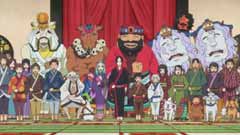 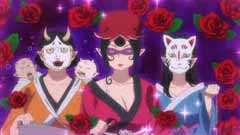
Now, to be fair, the former is grossly incompetent, in a manner that seems to contradict what we know of other depictions of King Enma but that falls right in line with the conventions of bosses and bureaucrats as depicted in salaryman manga, or in Dilbert for that matter. Still, there's an episode where Hozuki takes a little too much pleasure in an incapacitated King Enma, having thrown his back out, being completely at his mercy. There's actually a running joke of Satan (who visits on two occasions) being shocked at Hozuki being the one actually in control and having instituted a rather effective system of checks and balances that runs the place far better than would King Enma, given that he runs his own version of hell somewhat closer to a royal dictatorship (I suppose Western hell is in need of a French-style revolution?). Hozuki, to his credit, is at least generally much more polite to the ogres and the like who actually make an effort to do their job, but we still both came away convinced that he's the sort of supervisor that you'd never want to cross in real life.
And we do wish we could go into more of the characters in this show, but there are just so ridiculously many of them, even among the main players. Aside from Hozuki and Enma, we meet Momotaro, who now lives in Shangri-La with Hakutaku and serves as something of a straight man during his confrontations with Hozuki, and also his three animal companions who now work in animal-cruelty hell. There's also Karauri and Nasubi, two young grunt workers who show up from time to time, and a myriad of other ogres, denizens of the different parts of the afterlife, and visitors from other hells; the OP alone should give one a sense of how many characters there are. Hozuki and a few others aside, they're all mainly used for one-off references or jokes, but given the episodic structure of the show and its attitude towards Japanese mythology, something of a "fractured fairy tale" approach except even more morbid, this doesn't hurt the show, though the paucity of significant female characters is a downside.
Even beyond Hozuki's occasional needless cruelty, the show itself and its humor are very much based around vindication. Japanese Hell can get pretty specific about its realms of suffering, many of them based around very clear crimes; animal cruelty, slander, unfaithfulness, panty theft... and, well, if you're found guilty of the former, expect a hell where the animal chew you out. With their teeth.
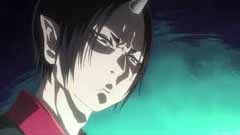 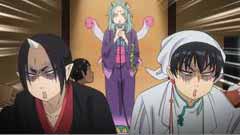 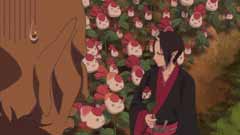
Due to the rapid-fire delivery of jokes, puns and offhand comments, it's hard to tell how much of the comedy is satirical of nature, or how much of the comedy we're missing by not being culturally invested enough in Japan. Would, say, a joke about Momotaro turning into a bully because he took too much pride in his role as a hero work as well if we weren't already familiar with the original story itself? Indeed, both of us had to do a bit of research while writing this review, and we found the notes in crunchyroll's subtitled broadcast to be a big help in general. It's an interesting combination of references, with the titles carefully censored just enough to avoid litigation: on the one hand, you have characters from Japanese classical mythology making an appearance, like a now-normal sized Inch-High Samurai who despairs at having lost his lone unique characteristic (as punishment for tricking his lover), and on the other, you have the main characters of My Little Monster making a brief appearance in ogre form.
The visual style, too, is a conglomeration of modern Japanese anime character designs coupled with background works sometimes based on ancient Japanese art styles, like E-Maki, calligraphy and paintings and lord knows what else we might be missing. This gives the show a rather unique and appealing look, and the animation is generally quite good, if low-key. The show isn't heavy on action, though some of the gags are rather physical in nature. Either way, the art style will either be the most appealing or alienating aspect of the whole show, depending on where your interests lie, although I think it's no stretch to say that Hozuki's appearance might be a draw for certain people.
Anyhow, either the art style or the fact that a lot of the humor seems to be centered around the vindicating aspect of hell introduced in Hozuki's Coolheadedness will polarize people. Really, the most striking part of the hell as presented here is the sheer level of irony in the punishments that are meted out here (if you're wondering; the panty thief will be buried in a pile of demon undies that demons wore for hundred years straight without washing them) as much as the complete lack of mercy on the part of the punisher. Understandable, in the sense that this is hell, but still mildly offputting because, again, it feeds on our own sense of vindication (Stig: seeing as Momotaro's old companions ended up getting new jobs in animal abuse hell, I got my own trial of fire (so to speak) through my own loathing of people who abuse or abandon animals). Whether this is something you feel strongly for or against, it's a stance the show takes, and we can at least respect it for that, regardless of whether we agree with it or not.
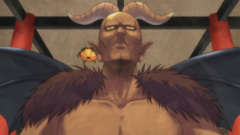 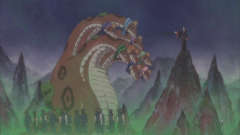 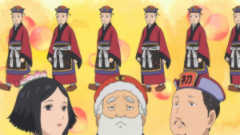
Stig: On average, I had a pretty good time with Hozuki's Coolheadedness. Sure, some of the... lessons... could get kind of mean, and even the main character could become a bit of an asshole at times, but despite this, the show is actually fun most of the time (unlike another show I would watch later, Gugure! Kokkuri-san, which was a mostly unpleasant show with a few funny gags.) Clearly, being more familiar with Japanese culture is going to be a lot of help watching this, but even if you don't, there's a lot of fun to be had here.
Nico: Comedy has always been hard for me, but ironically, I think I appreciate this show in part because of, not in spite of, the fact that it forced me to do a bit of homework while watching it; heck, I even learned a bit about classical Japanese mythology in the process, although my at-best pathetic grasp of Japanese means that I'm still going to miss most of the puns. Ultimately, I'm willing to overlook some of the mean-spiritedness because it's a blend of comedy that I like but don't come across often enough: wry, a bit grim, well-versed in its own subject, and willing to let the audience figure some of the jokes out on their own. It's sure to be an acquired taste, but it can be a lot of fun in the end.
A scorching, dry, sardonic tour of hell. You could say it's one HELL of a time. — Stig Høgset and Nicoletta Christina Browne
Recommended Audience: Surprisingly, given the main location of this show, the content could probably be classified as somewhat mild. Hozuki's Coolheadedness does take great pleasure in literally torturing a lot of its cast in various ways that are only nonfatal because the recipients are already dead; a bit more disturbingly, Enma and Hakutaku both undergo a fair bit of physical abuse at Hozuki's hands. The grim, soul-crushing humor and even the fanservice (which is fairly equal-opportunity) occasionally troll the viewer; in the meantime, this show can be rather lewd on occasion.
Version(s) Viewed: Digital stream on Crunchyroll, Japanese with English subs.
Review Status: Full (13/13)
Hozuki's Coolheadedness © 2014 Kodansha, Starchild Records, Mainichi Broadcasting System.
|




